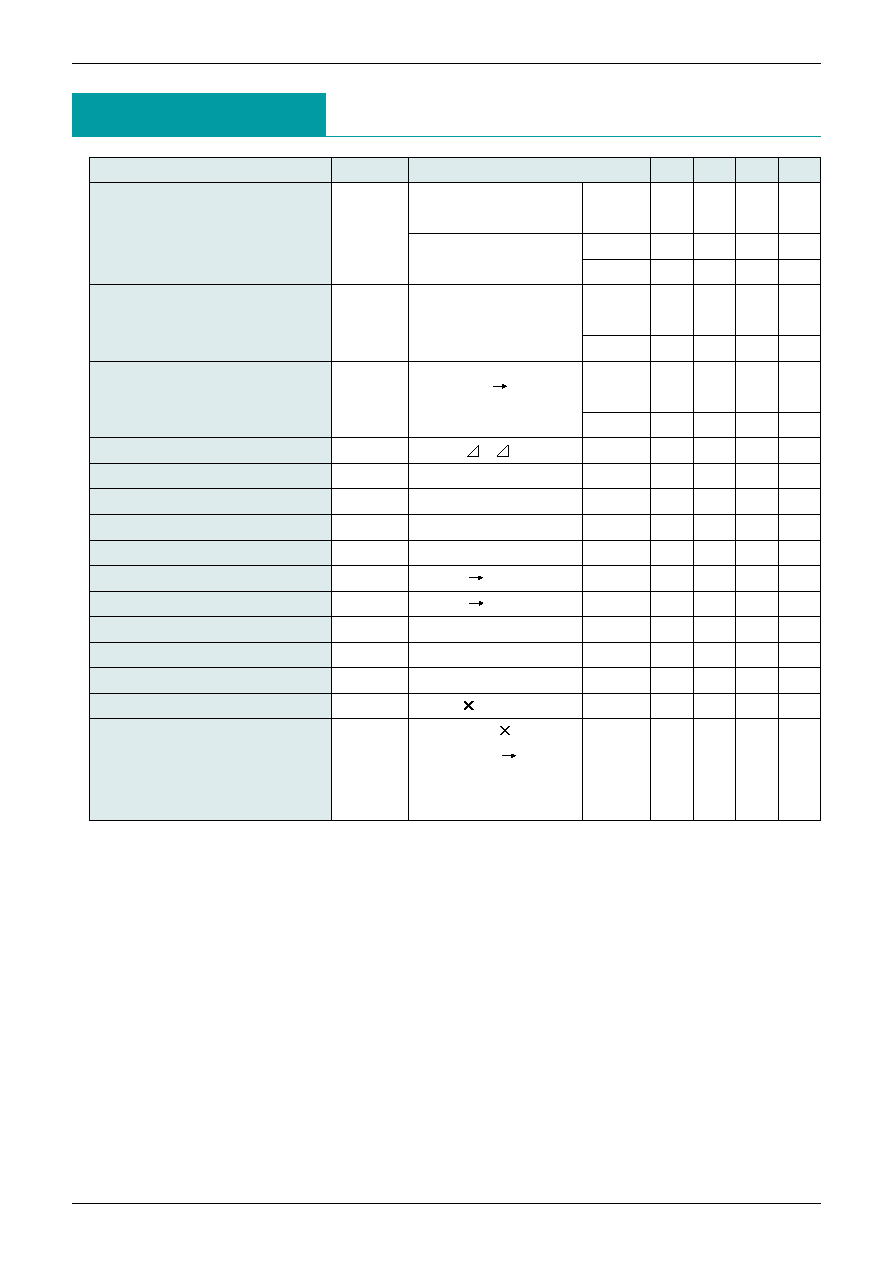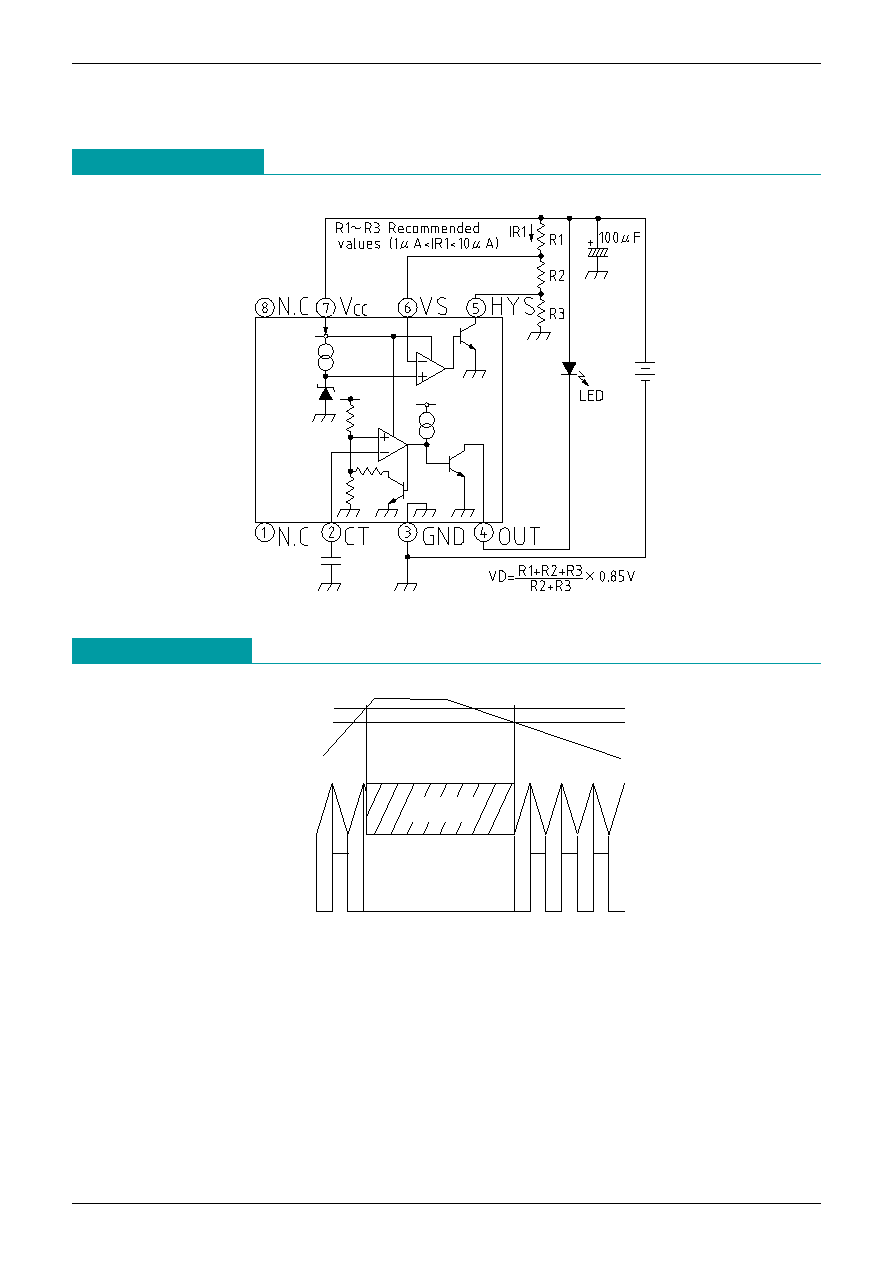 | –≠–ª–µ–∫—Ç—Ä–æ–Ω–Ω—ã–π –∫–æ–º–ø–æ–Ω–µ–Ω—Ç: MM1252AF | –°–∫–∞—á–∞—Ç—å:  PDF PDF  ZIP ZIP |

MITSUMI
Remaining Battery Power Display MM1251, 1252, 1253
Remaining Battery Power Display
Monolithic IC MM1251, 1252, 1253
This IC detects battery voltage and displays the power remaining in the battery. Display of the battery's
remaining power is an indispensable function for portable equipment. The use of this IC makes this display
easily achievable.
The usual method of display of remaining battery power, as in the MM1206, is three marks lighting up in
sequence on an LED or other display. This IC, however, uses only one light to display the remaining battery
power, resulting in lower cost.
Outline
Features
1. Adjustable flashing speed
2. Adjustable detection voltage supports all settings
3. Adjustable hysteresis voltage enables response to large ripple settings
4. High precision voltage detection (MM1253) enables support of sets using nickel cadmium and other
batteries
5. The LED can be lit up by the voltage from one battery (type of special built-in step-up circuit : rank B)
Package
SOP-8D (MM1251AF, MM1251BF, MM1252AF, MM1252BF, MM1253AF)
Series Description
Display Pattern
Normal
Low Power
Detection Precision
MM1251
Light Off
Flashing
±30mV
MM1252
Light On
Flashing
±30mV
MM1253
Light Off
Flashing
±9mV
Absolute Maximum Ratings
(Ta=25∞C)
Item
Rating
Unit
Storage temperature
-40~+125
∞C
Operating temperature
-20~+70
∞C
Input voltage
-0.3~+3
V
Output Terminal Applied Voltage
-0.3~+7
V
Allowable loss
300
mW

MITSUMI
Remaining Battery Power Display MM1251, 1252, 1253
Electrical Characteristics
(Unless otherwise specified Ta=25∞C, Vc=1.5V, Vs=0.8V)
(Applicable to all models when the model name is left blank.)
Item
Symbol
Measurement Conditions
Min. Typ. Max. Unit
V
S
=1.0V
MM1251
25
40
µA
Current consumption 1
I
CC
1
MM1253A
V
CT
=0.4V
MM1252A
0.15
0.25
mA
MM1252B
0.75
0.1
mA
MM1251A
0.15
0.25
mA
Current consumption 2
I
CC
2
V
S
=0.8V, V
CT
=0.4V
MM1253A
MM1251B
25
40
µA
V
S
=1V 0.5V
MM1251
0.82
0.85
0.88
V
Detection voltage
VD
V
HYS
<
= 0.1V
MM1252
MM1253 0.841 0.85 0.859
V
Detection voltage temperature factor
V/ T
±200
PPM/∞C
HYS pin saturation voltage 1
V
HYS
1
I
HYS
=5µA
25
50
mV
HYS pin saturation voltage 2
V
HYS
2
I
HYS
=25µA
50
100
mV
C
T
pin charge current
I
CTS
V
CT
=0.1V
-60
-40
-20
nA
C
T
pin discharge current
I
CTO
V
CT
=0.4V
20
40
60
nA
C
T
pin threshold value H
V
CTH
V
CT
=0.1 0.4, V
O
<
= 0.1V
0.2
0.3
0.4
V
C
T
pin threshold value L
V
CTL
V
CT
=0.4 0.1, V
O
>
= 0.1V
0.1
0.2
0.3
V
Output sink current
I
OUT
V
CR
=0.4V
5
10
mA
Output saturation voltage
I
OUT
L
V
CT
=0.4, I
OUT
=1mA
100
150
mV
Output leak current
I
LE
V
S
=1V, V
OUT
=5V
1
µA
Operating limit voltage
V
OPR
V
S
=0.8 V
CC
V
OUT
> 0.4V
Rank A
0.65
0.75
V
V
S
=0.8 V
CC
Step-up operation limit voltage
V
OPL
V
CC
=0.1V 0.5V
Rank B
0.85
0.95
V
Voltage limit for maintaining
LED flashing

MITSUMI
Remaining Battery Power Display MM1251, 1252, 1253
MM1251A /MM1253A
Application Circuit
Timing Chart
unsettled
V
CC
CT
OUT
VD
Note: The flashing region varies according to the VF value of the LED. We recommend using LEDs with a low VF value. Or, if
necessary, insert a current limiting resistor.

MITSUMI
Remaining Battery Power Display MM1251, 1252, 1253
MM1251B
Application Circuit
Timing Chart
unsettled
V
CC
C
T
VD
OUT

MITSUMI
Remaining Battery Power Display MM1251, 1252, 1253
MM1252A
Application Circuit
Timing Chart
unsettled
V
CC
CT
VD
OUT

MITSUMI
Remaining Battery Power Display MM1251, 1252, 1253
Step-up (Rank B) Type Inductor Values
This circuit allows step-up for LED lighting even when low only. The LED repeats On/Off at high frequency,
but to the human eye it appears as if the LED is lit. Therefore, we do not recommend the use of this step-up
circuit in other circuits.
Flash Cycle
Oscillation frequency
Off interval
Flashing interval
V
CC
100
200
300
500
700 1000
Inductor value (
µ
H)
V
CC
=0.90V
V
CC
=0.95V
V
CC
=1.00V
10
20
30
50
70
100
200
300
500
Oscillation frequency (kHz)
Inductor Value-Oscillation Frequency Characteristics (reference data)
Note : The above data are reference values. Please set constants using a ±50% variance.





